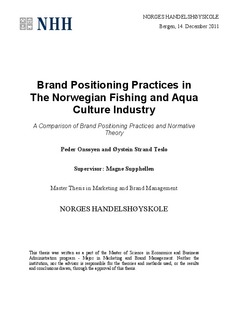| dc.description.abstract | This thesis is about the importance of Brand Positioning. We look at Brand Positioning with regards to how practices are within one of Norway‟s most important industries - the Norwegian Fishing- and Aqua Culture Industry. There is the first research contributing to this particular field within this industry.
We based our research on three research questions. First, we wanted to present and analyze relevant Brand Positioning theory. The chosen theory is mainly based on four renowned theorists‟ within Brand Positioning. We divided theory into five different parts; Brand Positioning Culture, Information Collection, Defining Brand Positioning, Implementation of Brand Positioning and Intended Effects of Brand Positioning. Theory is presented with a comparison and analysis of the different researchers‟ views. This comparison led to a development of a synthesis of the different Brand Positioning aspects; a Normative Framework. This framework is a basis for measuring Brand Positioning capabilities.
We uncovered what companies‟ consider to be their strengths and weaknesses within Brand Positioning capabilities in relation to the Normative Framework. Our findings indicate that the industry in general consider themselves to be strong with collecting information, while there are signs of weaknesses with the implementation aspect of Brand Positioning. Our findings reveal several potential improvement areas for Fishing and Aqua Culture companies within Brand Positioning.
In the final part of the research we compared companies‟ Brand Positioning practices and their economic performance. More specifically we looked at the companies‟ profit margins. Our analysis indicates that the definition aspect of Brand Positioning has a positive impact on profit margins. Only 45.2% of the surveyed companies state that they have a defined position for their brand, and merely 26.9% have a document that describes it. A lot of companies fail to come up with a position for their brands, and show a misunderstanding of what Brand Positioning means – to specifically state how their brand can be positively unique in comparison with competitors. We see that companies agree with the importance of defining a Brand Positioning, but they show poor enactment of it. This is a major improvement area within one of our nation‟s most important industries. If more companies‟ defined their brand‟s position, their economic performance could be a lot stronger than it is today. | no_NO |
